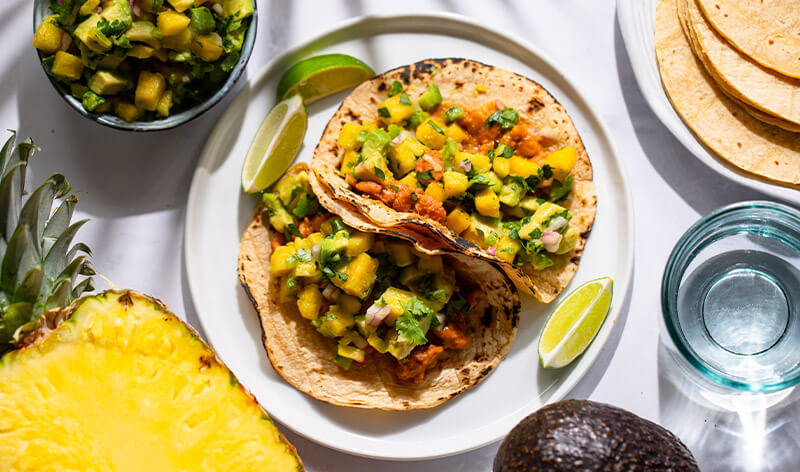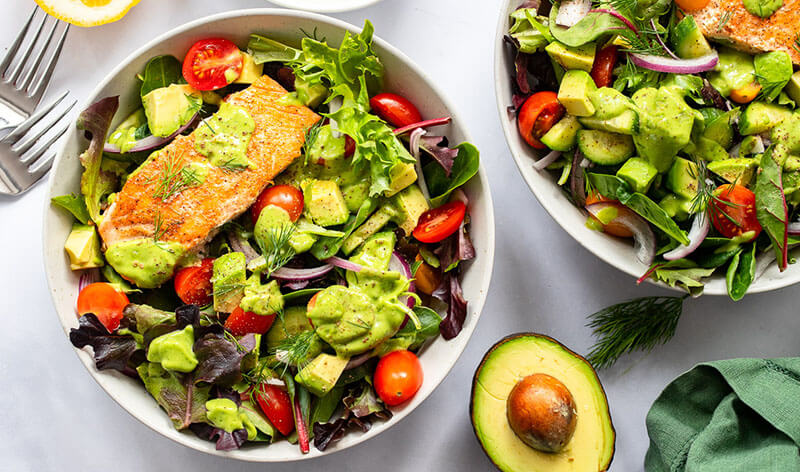To help support cognitive health as you age, focus on a balanced diet rich in fiber, healthy fats, protein, and antioxidants. These nutrients fuel brain cells, protect against inflammation, and strengthen memory and focus. You can find these nutrients in these foods:
- Leafy Greens & Vegetables: Spinach, kale, and broccoli supply lutein, folate, and vitamin K that may slow cognitive decline.
Berries: Blueberries and strawberries contain antioxidants that protect brain cells. - Whole Grains & Legumes: Oats, brown rice, lentils, and black beans deliver fiber to support gut and brain health
- Nuts & Seeds: Walnuts and chia seeds provide omega-3s and vitamin E for memory and focus.
- Fatty Fish: Salmon, sardines, and other low-mercury fish offer DHA for brain cell communication.
- Avocados: A unique fruit with 6g of healthy fats, 3g of fiber, 1g of protein, and 136 mcg of lutein per 50 g serving that supports memory and problem-solving.
- Olive Oil & Plant Oils: Healthy fats that complement a brain-focused diet.
On the other hand, you’ll also want to limit foods like:
- Fried foods, fast food, and sugary snacks.
- Red meat and cheese in excess.
It’s only natural for your cognitive health to decline as you age. After cognition peaks at 30, your ability to think quickly, multitask, focus, and remember information starts declining. These are just symptoms of a healthy older brain. As you age, you also become more at risk of developing dementia and Alzheimer’s.
For decades, doctors and researchers have been trying to find a way to reverse this progression, both normal and abnormal cognitive declines. While there is no cure-all, improving your overall health can positively support your cognitive well-being, too. One way to do that is by focusing on your diet. This doesn’t mean that a singular food can fix your cognitive health, but instead, that maintaining a balanced diet can contribute to multiple aspects of brain health.
The Connection Between Nutrition and Brain Health
Everything you eat fuels your brain. What you consume directly affects how you develop brain cell membranes and neurotransmitters, which are responsible for memory, focus, and overall thinking ability. When you don’t fuel your brain with the nutrients it needs, your cognitive abilities will naturally decline over time. This means it’s vital to discover foods and diets that can support cognitive health for the short- and long-term.

While nutrition is an integral part of maintaining brain health, it works best when combined with other healthy habits. Getting regular physical activity and prioritizing sleep both support cognitive health. When diet and lifestyle habits work together, they create a strong foundation for long-term brain function and overall well-being.
You can see this in an observational study of nearly 3,000 participants conducted by the National Institutes of Aging. Researchers found that people who followed at least four or all five healthy lifestyle habits had a 60% lower risk of Alzheimer’s. One of those habits was eating a Mediterranean-DASH Intervention for Neurodegenerative Delay (MIND) diet, which emphasizes plant-based foods to reduce the risk for dementia. The study does not show cause and effect, and the findings may not apply to all populations, yet it indicates that simply prioritizing a balanced diet, which the MIND diet focuses on, can support your overall health, including your cognitive health.

How Your Diet Affects Your Mental Health
Similar to how your diet affects your cognitive health, it also affects your mental well-being. For instance, when you eat foods that support your gastrointestinal tract, you also support its regular functions, including helping produce neurotransmitters like serotonin, which is responsible for your mood. In addition, foods that support gut health can help produce “good” bacteria that can limit inflammation and create neural pathways between the gut and the brain. This way, your gut health and mental health are inextricably connected.
Our diet can also go so far as affecting the risk of developing mental health disorders. For instance, in a cross-sectional online study of 428 healthy adults, those who ate more fruits were less likely to experience symptoms of depression and more likely to report a positive psychological well-being. While more research is needed to establish causality within all populations, it does show how adding fruits like apples and avocados to your diet can potentially help support your mental health.
Vital Nutrients for Your Cognitive Health
As the body ages, the brain benefits from steady access to nutrients that protect its structure and function. Here’s how these nutrients can maintain your cognitive health:
Fiber for Cognitive Health
As mentioned, gut health is closely tied to overall cognitive and mental health, and fiber is a significant reason for that. Fiber aids digestion by bulking up stool and making bowel movements more frequent, but it can also help stabilize blood sugar levels, reduce inflammation, and facilitate the growth of “good” bacteria. This is the same bacteria that can help your gastrointestinal tract produce neural pathways between your gut and your brain. As a result, fiber can have far-reaching impacts on your focus, mood, and even memory as you age.
In fact, a prospective study found a link between higher dietary fiber intake and increased mental health-related quality of life eighteen years later in 14,129 post-menopausal women from Iowa. Essentially, the women self-reported having a better quality of life related to their mental and cognitive health. While these results aren’t causal and the findings cannot yet be translated to the general population, it does illustrate promising results that long-term cognitive and mental health can benefit years after changing your diet.
Avocados, as a plant-based food with 6 g of healthy fats per 50 g serving, are a natural component of the Mediterranean diet.

Good sources of fiber include:

Whole grains:
234 g of cooked oatmeal has 4 g of fiber, and 195 g of cooked brown rice has 3.5 g of fiber.

Legumes
86 g of black beans has 7.5 g of fiber, and 99 g of lentils has 7.8 g of fiber.
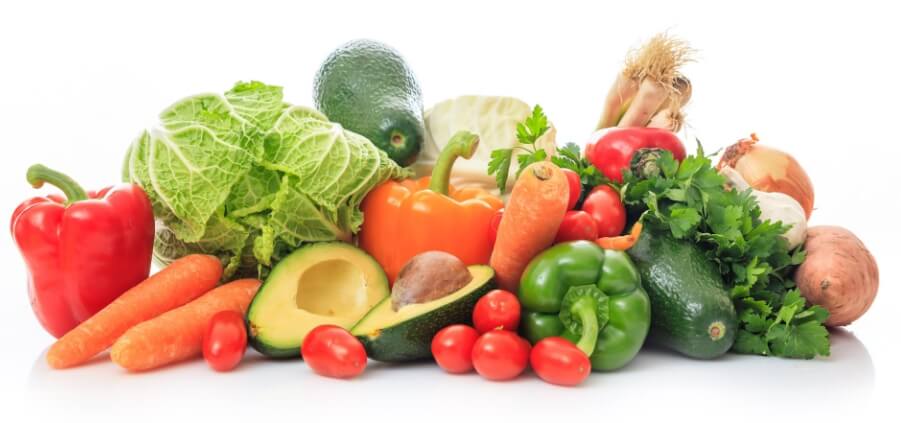
Plenty of vegetables and fruits
One medium-sized apple has 4 g of fiber, and one-third of a medium-sized avocado has 3 g of fiber.
The USDA recommends that you eat 14 grams of fiber for every 1,000 calories you eat. So if you eat 2,000 calories in a day, you should aim to eat 28 grams of fiber. Keep this in mind as you plan out your meals for the day.
Healthy Fats for Brain Function
Unsaturated fats, also known as healthy or “good” fats, are essential for the brain because they provide energy and help build cell structures. Among the most important are omega-3 fatty acids, including DHA, which play a key role in maintaining brain cell membranes and supporting communication between brain cells. These fats also help reduce inflammation in the body, which may protect the brain as it ages. Healthy fats also help your body absorb fat-soluble vitamins that benefit long-term health, such as vitamin E.
To eat more healthy fats, look for foods like:
- Fatty fish: Fish like salmon have 4 g of unsaturated fat in a 3-oz serving, while sardines have 7 g of unsaturated fat in a 5-oz can.
- Nuts and seeds: Many nuts and seeds are excellent sources of unsaturated fats. For example, one ounce of walnuts has over 13 g of unsaturated fats in a 1-oz serving, and chia seeds have 7 g of unsaturated fats in 2 tablespoons.
- Avocados: Avocados are unique in the fact that they are the only fruit that contains healthy fats, with over 6 g of unsaturated fats in a 50 g serving.
Including these foods in a balanced eating plan can support cognitive health, aid in focus, and help the brain function effectively over time.
Protein for Cognitive Resilience
Protein is also another nutrient that is integral to cognitive well-being. Protein is a vehicle for amino acids, which your body needs to support neurotransmitter development. Neurotransmitters are essentially chemicals that help brain cells communicate, enabling us to function. Eating foods with protein can help facilitate this process, keeping your brain resilient and maintaining your focus.
Researchers have found a correlation between better cognitive function and protein intake in older adults. In a National Health and Nutrition Examination Survey (NHANES), researchers discovered that among 2,460 participants over the age of 60, there was a positive association with performing better on cognitive tests among those who consumed more protein from meat, eggs, and legumes. While researchers stated they can’t prove causation, they did find a correlation between this nutrient and adults who had better overall cognitive health at the time of testing.

Knowing the potential benefits of protein, it’s best to look for sources that are high in this nutrient, such as:
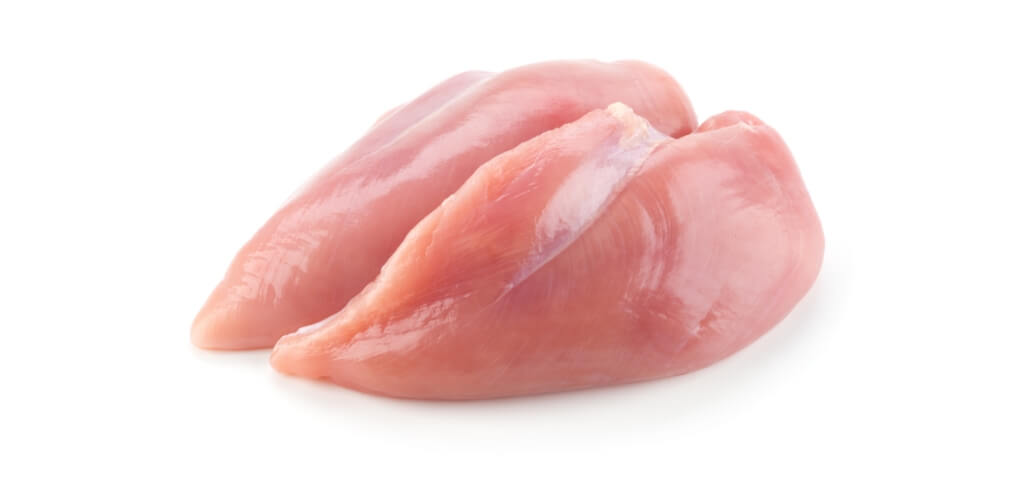
Lean meats like chicken and turkey have plenty of protein with minimal amounts of saturated fats that are often associated with heart disease and other adverse health effects. For example, chicken breast has 26 g of protein in 3 oz, and turkey breast has 25 g of protein in 3 oz.

Legumes are one of the most common plant-based sources of protein. In an 86 g serving of black beans, you can find 7 g of protein, and 9 g of protein in a 99 g serving of lentils.
Pairing protein-rich foods with fruits, vegetables, whole grains, and healthy fats creates a balanced eating pattern that supports both cognitive and physical well-being.
Colorful Vegetables and Leafy Greens with Lutein
Lutein is just as crucial when it comes to adding powerful nutrients to your brain health diet. This carotenoid supports both eye health and cognitive function. It’s also found in many plant-based foods to give them their pigment. Most recently, research suggests that lutein may have the potential even to improve memory.
In an Avocado Nutrition Center-funded clinical study of 40 healthy, older adults, researchers found that people who consumed one avocado (which contains 369micrograms of lutein) per day for six months had higher blood and eye lutein levels compared to when they started the study. The avocado group also had improvements in cognition as measured by improvement in working memory. Additionally, as macular pigment density increased, spatial working memory and efficiency of approaching a problem also improved. Although you can’t generalize the conclusions proposed in this study for all populations, the research suggests a dietary intervention with lutein may be a useful dietary strategy for cognitive health.
In addition to avocados, these foods also have lutein:
- Spinach
- Kale
- Collard greens
- Broccoli
- Bell peppers
- Carrots
Including a variety of these foods in the diet not only provides lutein but also delivers fiber, vitamins, and minerals that work together to support brain health.
How To Build a Balanced Cognitive Health Diet
Building a brain health diet filled with healthy fats, lean proteins, fiber, and plenty of vitamins and minerals does not need to be complicated. Simple meals with a mix of food groups can provide what the brain needs.
For example, focus your day around meals like:

When you wake up in the morning, you can make a bowl of oatmeal with blueberries and walnuts or even an omelet with red bell peppers, avocado, and chicken breast.

By lunchtime, you can make a salad with leafy greens, beans, avocado, and grilled chicken.

At the end of the day, you can cook salmon and build sides with cooked brown rice and steamed broccoli.
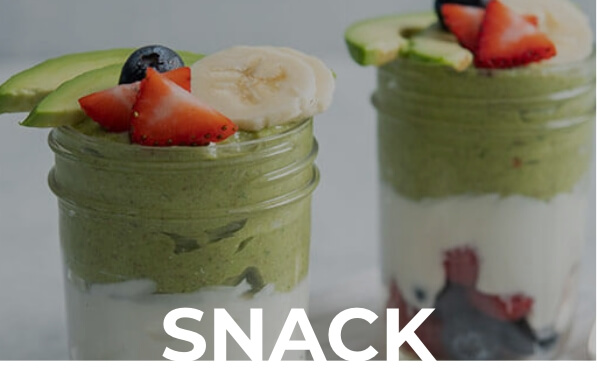
If you get hungry in between meals, you can eat snacks like apple slices with nut butter or yogurt with berries.
Each meal pairs protein, fiber, and healthy fats in a way that helps maintain steady energy and supports both brain and body health.
To ensure you get all the nutrients you need, you can also prep all of these meals in advance. Perhaps you dedicate your Sunday mornings to cooking your proteins, so you only need to prepare your whole grains, healthy fats, and produce when you want to eat the rest of the week. You can also utilize pre-prepared foods like canned beans, frozen vegetables, or salad greens. This can help you save time and mental energy when you may not have some to spare, thanks to all the challenges life throws at you.
Avocados: A Great Complement To a Brain Health Diet
Of any food, avocados can be a great addition to a balanced diet dedicated to your brain health. A single 50 g serving includes 6 g of unsaturated fats, 3 g of fiber, 1 g of protein, and 136 micrograms of lutein — all of which are tenets of a beneficial brain health diet. There’s also evidence that eating avocados is associated with positive health effects as you age.
In one observational study funded by the Avocado Nutrition Center that used NHANES survey data of 24-hour dietary recalls with over 2,800 older adults, those who ate about 50 grams of guacamole or 70 grams of fresh avocado in a day had better cognitive function than non-consumers. Although the findings are not causal, and more studies are needed to confirm these conclusions, the data suggest a potential role for avocados in cognitive health.


